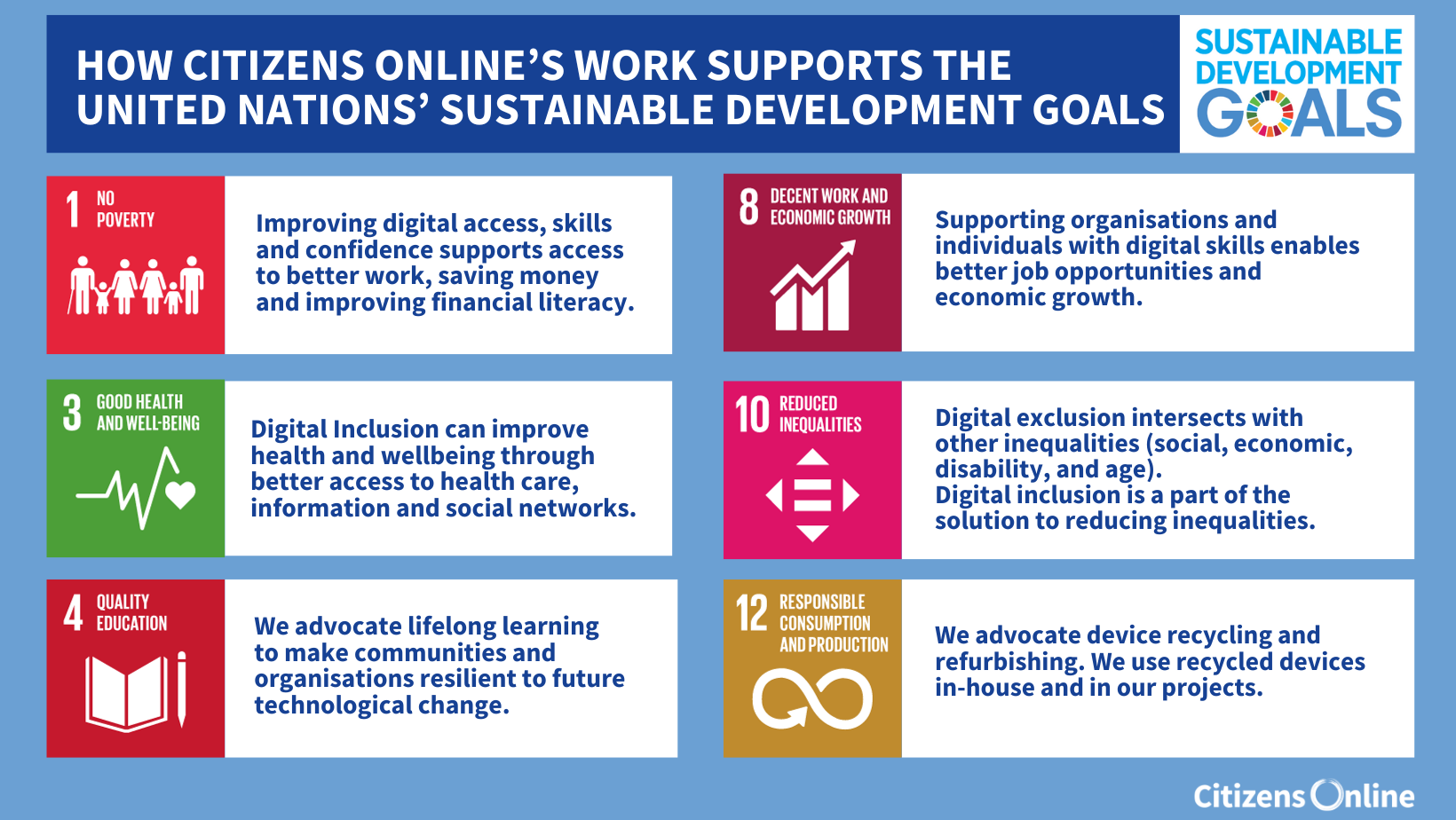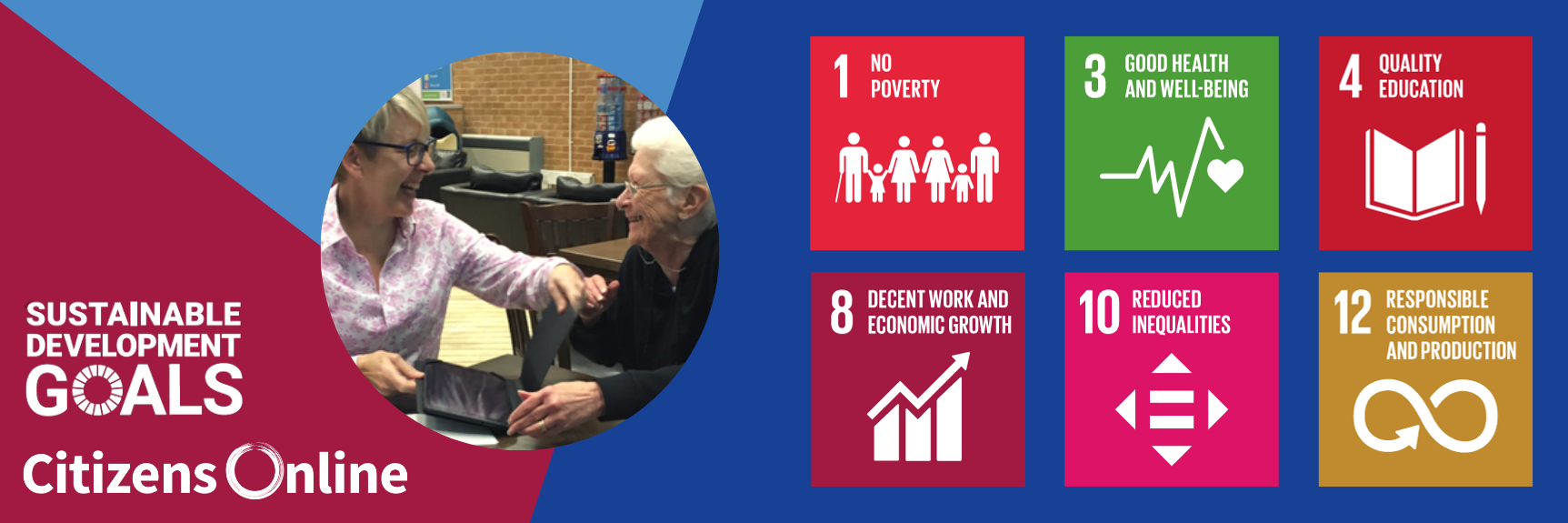In 2012 the United Nations (UN) produced 17 Sustainable Development goals to achieve “a better and more sustainable future for all”. The goals relate to global environmental, political and economic challenges. You can read more about the goals here. In the lead up to the United Nations Day on the 24th October, we are exploring how Citizens Online’s work contributes to these goals.
Digital exclusion can affect anyone. But, lack of access to the online world is more likely if linked with poverty, disability, and age. Our work at Citizens Online supports a digitally inclusive society. We work towards this by:
- Supporting people to improve digital skills and confidence
- Providing devices and connectivity for those that can’t afford them
- Advocating for the recycling of devices to support a more sustainable, circular economy and reducing landfill waste
- Advising organisations on best practice to ensure their digital services are inclusive
- Embedding digital inclusion into orgnisations and communities
We know from our research and experience that becoming digitally included enables the learners we support to access: essential services such as benefits and health advice, stay in contact with family and friends, apply for jobs, save and manage money. These activities result in improved mental health and wellbeing, access to education, better employment opportunities and improved confidence. As more services and day-to-day activities move online, more importance is placed on digital access as a basic right. Improving digital inclusion is key to achieving the global sustainability goals.
Goal 1 – “End poverty in all its forms everywhere”
Digital Poverty is a type of poverty and can affect anyone. It is “the inability to interact with the online world fully, when, where, and how an individual needs to”.1 With more and more essential services moving online, it is imperative to end digital poverty. Digital poverty is created by:
- Lack of or poor connectivity e.g. Wi-Fi
- No or limited access to digital devices like a laptop, tablet, phone, or assistive technology
- Lack of digital skills and/or confidence
- Having no support, or not knowing where to access support
People who are in digital poverty are digitally excluded. Although anyone can be digitally excluded at any point in their life, some people are more likely to be digitally excluded than others. Older people, people with disabilities, and those in poverty/ with low incomes are all at higher risk of digital exclusion. Tackling digital poverty therefore needs more than a single-issue approach. It involves looking at income poverty, support and access for disabled people and older people, looking at skills proficiency for those in and out of work.
Removing the barriers of digital poverty can open opportunities to work, become more financially literate, and learn new skills. Some learners may have access to a smartphone but cannot afford a laptop. Laptops make writing documents, creating CVs, applying for jobs and completing courses for skills or work much easier. We provided a group living in supported accommodation with laptops and digital support. Staff at the facility told us that our support was “invaluable” in helping residents look for work. One resident was able to complete their coursework and another could access their pay slips online and manage in-work benefits. We also supported parents in Brighton & Hove to access online training and find employment by providing laptops – you can read more here.
Goal 3 – “Ensure healthy lives and promote wellbeing for all, at all ages”
We know from experience that having digital devices, connectivity, confidence and skills can provide people with access to healthcare, improve their independence and boost their wellbeing. With our support, learners have joined local community groups, taken up hobbies, contacted friends and family more, and accessed support services.
Access to healthcare services is becoming more and more digital. Booking a GP appointment, checking test results, looking up health issues, using the NHS app all require some level of digital confidence and skill. We believe there should always be an offline option, but for many people there are huge benefits to navigating the digital world. We want as many people as possible to benefit from being online.
One learner needed to scan a medical document, and was able to do so on their own after support from us, they said:
“I looked at the notes I made when my Digital Champion was helping me and really pleased I could remember how to do it on my own. I really have benefitted from learning how to do it, it has been brilliant, thank you.”
For people who are housebound, being able to interact with others and accessing support, interests, hobbies, and services online can make a huge difference. For some learners, health conditions, disabilities, or caring responsibilities can make learning digital skills and building confidence more difficult. Digital skills support is typically based in person, usually in libraries or community centres. Read our blog on how bringing digital support to the home can be a part of overcoming digital poverty.
Goal 4 – “Ensure inclusive and equitable quality education, promote lifelong learning opportunities for all”
Lifelong learning is a core belief at Citizens Online as technology is forever changing and developing. We encourage lifelong learning in our work with organisations to improve digital leadership. Setting the culture to allow staff to learn and improve digital skills is crucial to achieving digital inclusion. We also promote lifelong learning with our digital champions, learners, staff and volunteers.
We help local councils, businesses and charities embed digital inclusion thorough our research and expertise in producing action plans and strategies, assessing the digital maturity of organisations. When digital exclusion is approached as an ongoing and cross-cutting issue by organisations, lifelong learning is promoted to staff and residents, opportunities are given for skill development, and digital support and devices are accessible for those that need them.
Additionally, we promote lifelong learning by offering on-going support through our phone line and in our on-the-ground projects. As one of our learners puts it:
“[the digital support has] massively promoted my confidence but also helped me realise how much more I have to learn”.
Furthermore, we take a flexible approach to learning environments by supporting learners one-to-one, in a group, and on the phone support. Peer support can be important as a learner described:
“Meeting other people from all walks of life and learning about what their IT problems were that I didn’t know about either – there is so much to learn from knowledgeable people”.
Lastly, we promote lifelong learning within both our staff and volunteer digital champions. Many learner sessions involve both the digital champion and learner working problems out together – taking a collaborative approach. We have even had a learner become a digital champion to use the skills they have learned to support others!
This is blog one of two, you can read the second post by following this link.

- Digital Poverty Alliance, https://digitalpovertyalliance.org/ ↩︎





